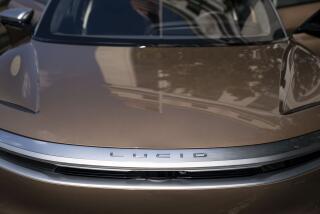Hyundai Closing Plants During Dispute : Autos: Inventories in U.S. are not expected to be affected immediately by precautionary move in South Korean labor strife.
- Share via
FOUNTAIN VALLEY — Besieged by five months of labor disputes, Hyundai Motor Co. decided Wednesday to temporarily close its plants in South Korea. The halt in production, however, should not hurt U.S. dealerships, according to the company.
“Inventories will not be affected,” said Debbie Douglas, a spokeswoman at Hyundai Motor America headquarters here.
Sluggish sales wrought by the recession, she added, have left “most manufacturers with a lot of inventory” on their hands.
Employees at the five Hyundai plants in the southeast Korean city of Ulsan threatened to strike if management failed to meet their demands, including higher salaries and better working conditions.
Korean car manufacturers commonly close plants during labor disputes to guard against sabotage and poor workmanship, said George C. Peterson, president of AutoPacific Group Inc., an automotive marketing firm in Santa Ana.
“The work force in South Korea has been restive for years, and these labor disputes boil up periodically,” Peterson said. “When you have a work force in that mind-set, it’s difficult to maintain the quality of products coming out of the plant. (Hyundai does not) want to take any risks.”
Peterson said Hyundai’s selection of cars would not be seriously reduced if the labor dispute is resolved within a few weeks.
“Hyundai is running with a 106-day supply of cars that are sitting at ports and on lots,” he said. “So they can suffer through something like this without it really hurting them.”
The auto maker’s current inventory is higher than usual, Peterson said. “The ideal level for a domestic manufacturer is a 60-day supply,” he said. “The market has been cold for the last three months, and most (car manufacturers) are overstocked.”
The manufacturer, which features low-priced cars, makes its Excel, Elantra and Scoupe models in South Korea. Its mid-size Sonata is produced in Bromont, Canada, and would not be affected by the plant closures.
The Elantra, a small sedan introduced only last fall, might be hardest hit if the labor dispute lingers, Peterson said. “It is trying to establish itself right now,” he said, “and to have a hiccup in the middle of its launch period could cause substantial marketing problems.”
Hyundai, which sold 117,630 cars in the United States last year, hopes to make the new Elantra its most popular line, he said.
Even if the dispute is settled before Hyundai’s inventory drops to a dangerous point, Peterson said, U.S. dealerships could see fallout from the stall in production.
“In a recession, you don’t want anybody walking away from your dealership,” he said. “It’s critical that you not only have the model but also the color that a customer wants.”






